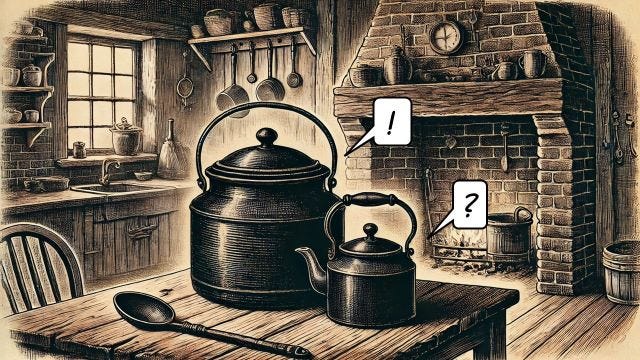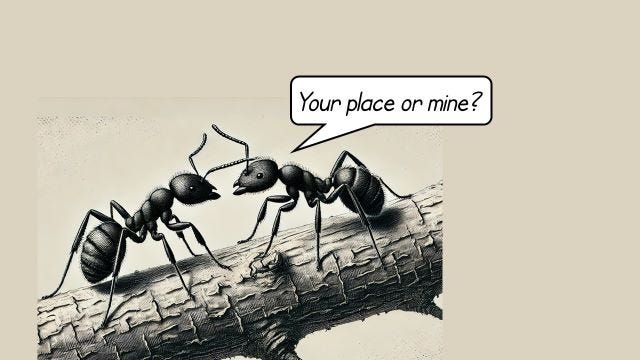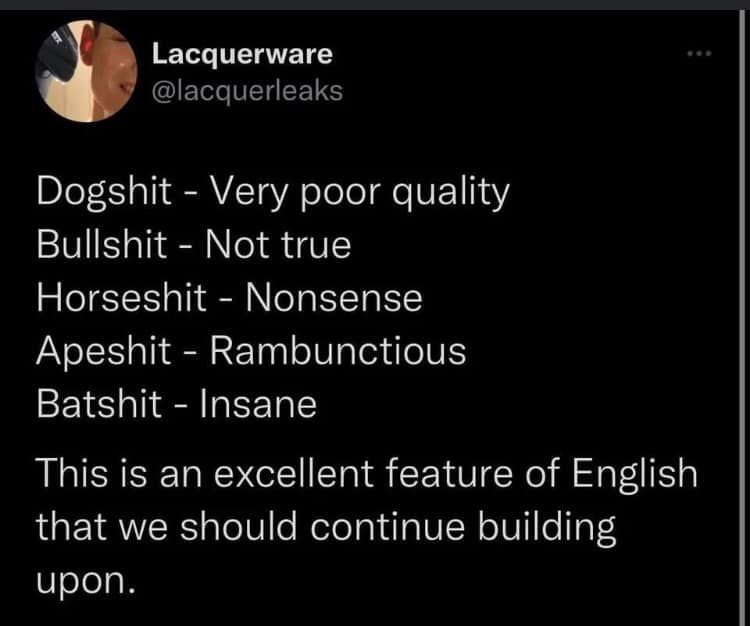From behind you can look up a cow's butt 🐄 It's an NSFW edition🔞
In which I use a LOT of swear words
Warning: NSFW means “not safe for work”. This is an internet acronym (= afkorting) to refer to content with sex or profanity* (= grof taalgebruik). The kinds of things you wouldn’t want your boss or colleagues to see while at the office. In other words, we’re going to get naughty. Proceed with caution!
(It’s just this month. Next month will be some harmless subject again, like, I don’t know, the weather, or board games or something.)
Welcome to the latest instalment of English and the Dutch, the newsletter with tips and tricks, fun facts, new translations and other good stuff about how Dutch speakers speak English. In your inbox every third Wednesday of the month.
The newsletter is written by me, Heddwen Newton. I’m half Dutch, half British, and I work as a translator, teacher, and linguist. I am the owner of the website www.hoezegjeinhetEngels.nl, and the newsletter English in Progress.
*and sometimes violence, but there won’t be any of that in this newsletter.
Preamble
It’s a new section! I’ve decided to start with a little ramble about why I chose the month’s topic. Will you like it? Will you hate it? Let’s find out!
The past week has been quite thrilling for me, as my follower count on the social media platform Bluesky is soaring. Some big names in the English linguistics bizz have been promoting, which makes me happy, grateful and gives me imposter syndrome all at the same time. Among them Gretchen McCulloch, whom I owe a lot to, but also Jesse Sheidlower, an American lexicographer who is known for compiling a historical dictionary on the word “fuck”.
The dictionary, called The F- Word, is wonderful because it treats its subject like any other word, listing usages and examples. There are no puns or innuendos or unnecessary padding. Though it exists mostly, of course, because the writer and the publisher knew that a book with this title would make them money, it is still a meticulously researched, thoughtful, and delightful reference book.
The fourth edition came out just a few days ago. I thought it was the perfect occasion for a newsletter about profanity. Profanity and the Dutch.
Quiz
This Dutch speaker isn’t saying what they want to say with these sentences. What are they trying to say? What does the English speaker understand? How should they have worded it?
We spent hours screwing on the new bed, we just couldn’t get it to fit together right.
I think I know what the problem is: I told my husband the instructions said to put a wooden plug in the backside, but he didn’t manage it.
He said the opening was too crap.
And just because I know some of you will feel it is missing if I don’t add it:
After a while, we just gave up and decided to call a professional. My husband needed a break, so he walked to the corner shop for a little shag.
And if we’re doing this, let’s do it until the bitter end:
Do I feel bad about the whole thing? Oh no, don’t worry, I’m okay, whore.
Proverb
The proverb depicted below is the same in English and in Dutch. What is the proverb in English? What is it in Dutch?
Family ties
Dutch and English are cousins, perhaps even sisters, depending on how you like your familial metaphors. In this section, I highlight some surprising ways in which they are related.
If you are interested in language, and are on social media, you may have already seen one of the following two folk etymologies about “fuck”.
The first is that “fuck” was originally an acronym for “Fornication Under Consent of the King”, the story being that the king allowed his subjects to have sex (out of wedlock, one presumes) in order to repopulate an area after a plague or war.
The second is that F.U.C.K. would be stamped on documents of soldiers with sexually transmitted diseases; it supposedly stood for “Found Under Carnal Knowledge”.
Both theories are great fun, but both can immediately be discounted if one has knowledge of one simple Dutch verb: fokken. There’s no way the two aren’t related, and therefore it seems clear that “to fuck” is just an old word for sex.
But which one came first, “to fuck”, or fokken? I always assumed the Dutch meaning of fokken, to breed, came first, and that the lewd English version somehow derived from it. I had no real reason to think that, other than that it seemed likely. It turns out I was wrong.
In fact, we have no actual proof that the English “to fuck”, the Dutch fokken and the German ficken (which has been a lewd word for sex since at least the 16th century) are related at all. Though most etymologists believe that they are, there is a lack of written evidence. People said “fuck”, but they didn’t write it down, and medieval monks certainly weren’t using in their manuscripts!
Written records for the English “to fuck” go back further than Dutch fokken and German ficken, mostly because English written records go back further in general. But even for English, we can’t be sure where it came from. Many etymologists think it came from old Norse via Scotland; in Old Norse, fokka meant “to hit”. But nobody can prove this definitively.
Interestingly, “to fuck” has no cognates in modern Scandinavian languages, though Icelandic had fokka (moving quickly) until relatively recently. Danish used to have fukke (move back and forth), and Swedish had focka (press, bump), and apparently some dialects still have these words. Of course, Scandinavians do say “fuck” in the modern, English sense, having learned it from movies etc. In Norwegian, they spell it føkk, which I think is excellent.
And what about the Dutch fokken, what can we say about its origins? Surprisingly, fokken did not always mean “to breed”. In Dutch we have evidence for focken in the 15th century to mean “to trick or to prank someone”, in the 16th century to mean “to push or to bump”, and in the 17th century to mean “to have sex with”. That last one definitely had the same lewd connotation that “fuck” has now, just look at the sentence: Hoer Mary,... die hy ... eens lustich fockte [1657]. It wasn’t until a few decades after this that we see the meaning “to breed”.
This means the Dutch word fokken lost its lewd connotation rather than never having had it. The fact that it is now regaining this lewdness* under influence of the English “to fuck”, to the regret of many older Dutch speakers, might therefore be seen as an ironic twist of fate.
Sources: The F-Word, German, Scandinavian languages, Old Norse, Dutch
*In Afrikaans, fok and fokken are definitely swear words. I am told that Afrikaans speakers are stunned to hear that paardenfokker** is honestly a very decent word in Dutch.
**Here’s a classic:
During a meeting with John F. Kennedy, the Dutch Minister of Foreign Affairs Joseph Luns was asked about his hobbies. He said: “I fok horses”. Kennedy, surprised, asked: “Pardon?”, to which Luns replied “Yes, paarden!”
The story is not true (I have not been able to find the slightest bit of evidence for it, and I’ve really tried). Joseph Luns was internationally highly respected and spoke excellent, if accented, English. In fact, you can hear a conversation between him and Kennedy right here.
Untranslatable Dutch
Some Dutch words and expressions give translators a headache, because English just doesn’t have the same concept. Every month, I put a spotlight on two or three of them.
This month, rather than listing some untranslatable Dutch expressions, I present an excerpt of an excellent article I found a few years ago, which was written for an English-speaking audience. It explains that most untranslatable of Dutch swearing quirks: swearing with diseases.
Twanna Hines, who grew up in rural Illinois, moved to the Netherlands to pursue a graduate degree at the University of Amsterdam in 2000. Not totally used to the stream of bicycles and trams in the streets of Amsterdam, she wandered into a bike lane and got a mouthful from a passing cyclist. “And my Dutch roommate shouted back, in the Dutch translation, ‘Get cancer, man!’” she remembers. “And I was like, ‘What the hell? That doesn’t make any sense, why would you tell someone to get cancer?’”
This was not some bizarrely creative insult that her roommate came up with. The Netherlands, in fact, is home to a shockingly extensive list of swear words, and the ones you might use to yell at an errant pedestrian are largely medical in nature. You can tell someone you think they’re suffering from cholera, smallpox, or tuberculosis; you can tell them to “Typhoid off.”
Read the rest on Atlas Obscura.
Funny Dutch
Dutch has a few idioms and proverbs that are pretty vulgar if you think about it.
fucking ants
A Dutch speaker who is fucking ants (mierenneuken) would be splitting hairs in English, or, if they are being a bit argumentative about the hairs they are splitting, you might say they are quibbling or fussing. Another good translation is nitpicking, which translates back to Dutch as a rather lovely luizen pluizen. More here.
it will rust me on my arse
Het zal me aan mijn reet roesten can be translated with even more vulgarity into English by saying “I don’t give a fuck”. However, there are quite a few things you can choose not to give in English: “a damn”, “a toss”, “a rat’s arse”, “a monkey’s arse”, “two figs”, and many more. Other options are “I couldn’t care less” (or “I could care less” for a subset of Americans), or “it doesn’t make the slightest bit of difference to me”. More here.
from behind you look up a cow’s arse
When noting the fact that it is easy to be wise after the event, Dutch speakers have the rather wonderful proverb van achteren kijk je een koe in de kont (or: achteraf kijk je een koe in de kont). The most common way to say this in English is that hindsight is 20/20. When you have 20/20 vision, it means you don’t need glasses, so the idiom is saying that when you look back on past events, it is easy to see everything clearly. More here.
there is crap on the marble
One of the more disgusting Dutch idioms, I find, because I hate the mental picture of playing with marbles and then one of them accidentally rolls through… eww. Stront aan de knikker is versatile; it can mean that there is something fishy going on, or that there’s trouble brewing. It can also mean that the trouble has already started, and then the English idioms get disgusting as well: the shit hits the fan, or there is a shitstorm. More here.
Quiz answers
We spent hours screwing on the new bed, we just couldn’t get it to fit together right.
What are they trying to say? - We hebben urenlang aan het nieuwe bed geschroefd, maar we kregen hem maar niet goed in elkaar gezet.
What does the English speaker understand? - We hebben urenlang op het nieuwe bed geneukt, maar we kregen het maar niet goed passend.
How should they have worded it? - We spent hours assembling the new bed, we just couldn’t get it to fit together right.
I think I know what the problem is: I told my husband the instructions said to put a wooden plug in the backside, but he didn’t manage it.
What are they trying to say? - Ik denk dat ik weet wat het probleem is: ik heb mijn man verteld dat de instructies zeiden dat er een houten plug in de achterkant moest, maar hij kreeg het niet voor elkaar.
What does the English speaker understand? - Ik denk dat ik weet wat het probleem is: ik heb mijn man verteld dat de instructies zeiden dat er een houten plug in het achterwerk moest, maar hij kreeg het niet voor elkaar.
How should they have worded it? - I think I know what the problem is: I told my husband the instructions said to put a wooden plug in the back, but he didn’t manage it.
He said the opening was too crap.
What are they trying to say? - Hij zei dat de opening te krap was
What does the English speaker understand? - I would understand: Hij zei dat de opening te bagger was (of bad quality). However, “crap” can also mean stront, so a connection with that word is easily made.
How should they have worded it? - He said the opening was too small. (“Tight” would also be an option)
After a while, we just gave up and decided to call a professional. My husband needed a break, so he walked to the corner shop for a little shag.
What are they trying to say? - Na een tijdje gaven we het gewoon op en besloten we een professionele dienstverlener in te schakelen. Mijn man had even pauze nodig, dus liep hij naar de buurtsuper voor wat shag.
What does the English speaker understand? - Na een tijdje gaven we het gewoon op en besloten we een professionele dienstverlener in te schakelen. Mijn man had even pauze nodig, dus liep hij naar de buurtsuper een vluggertje. (Some quick sex.)
How should they have worded it? - After a while, we just gave up and decided to call a professional. My husband needed a break, so he walked to the corner shop for a little loose tobacco.
This one is old-fashioned by now, simply because not many Dutch speakers use loose tobacco any more. Plus loose tobacco is, in fact, also called “shag” by many English speakers. But it’s a famous false friend, and with all this sexual innuendo going on, I couldn’t leave it out. (More here.)
After the whole “screwing” situation that went before, “professional” might of course be understood to mean a prostitute, but in itself the word is not wrong. Professional IKEA-furniture assemblers do exist, I am told.
Do I feel bad about the whole thing? Oh no, don’t worry, I’m okay, whore.
What are they trying to say? - Voel ik me slecht over het hele gebeuren? Oh nee, maak je geen zorgen, het gaat goed met me, hoor.
What does the English speaker understand? - Voel ik me slecht over het hele gebeuren? Oh nee, maak je geen zorgen, het gaat goed met me, hoer.
How should they have worded it? - Do I feel bad about the whole thing? Oh no, don’t worry, I’m okay.
The Dutch hoor is not without function; it makes a sentence softer, and more personable. It also gives information; in this case something like an extra “no worries” - it’s a shame that English has no good equivalent. Because of this lack of equivalent, quite a few Dutch speakers retain the Dutch word hoor at the end of these kinds of English sentences. They feel something is missing, and as they can’t find an English term, they put in the Dutch one.
In some cases, these kinds of foreign fillers aren’t problematic, like the French, Italian and Spanish habit of ending an English sentence with no. It can sound quite charming, no?
Unfortunately for Dutch speakers, hoor sounds just about exactly like “whore”. I have had quite a few students who had the habit of calling all their conversation partners prostitutes.
Proverb
De pot verwijt de ketel dat hij zwart is
It’s the pot calling the kettle black
(Most proverbs about swearing, being naughty, sex and things like that are not the same in English and in Dutch. This was the best one I could find that had at least a passing relevance to this newsletter’s theme, as it is at least about arguing and name-calling.)
And finally…
And finally, a silly joke, funny video or interesting picture that I found on the Internet, that has something to do with Dutch, English, or the newsletter’s theme.
(Longer definitions and example sentences here.)
Get free postcards
If you get ten people to sign up to this newsletter, I will send you ten funny postcards with texts like “I stick you a heart under the belt”, “heartily thank” and “hurray, you are yeary!”
Get just three people to sign up, and you get access to a page with cartoons, jokes and memes about the English language. (With explanations, because I hate it when I don’t get a joke.)
Use the button below to get a special link that you can share via email or on social media.
Any mistakes in this newsletter were put in by me AFTER my four amazing proofreaders checked through it. Thank you, you wonderful people!
Would you also like to receive this newsletter two days early and have the chance to tell me everything that is wrong with it? (I love a ruthless proofreader!) Or just your thoughts, ideas and additions? (I love thoughts, ideas and additions!) Let me know by replying to this newsletter.








“Danish used to have fukke (move back and forth)” - maybe it has a Viking origin. That would actually make sense
Hahaha I like it!